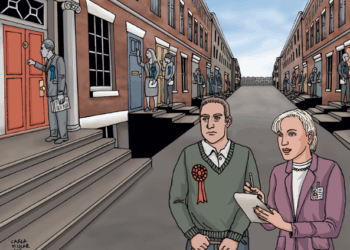James Yucel is the Director of Conservative YIMBY
Steve Reed chose an odd moment to blink. After months of promising to unclog England’s planning arteries in a suspiciously familiar-looking hat, he confirmed this week that the backbone of his reforms would not be statutory. National Development Management Policies (NDMPs), the long-promised national rulebook for a system now thicker than the complete works of Tolstoy, are off the table.
A national framework that could have ended the absurdity of forty-odd bespoke flood risk studies for a single site and acted as a remedy for the councils whose local plans date back to the Bronze Age. It always sounded too good to be true…
In its place sit yet more devolved improvisations, more local veto points, more baroque paperwork. And that, really, is the story. Not the death of one reform, but the continuation of a pattern. Britain keeps devolving planning power without giving local authorities the capacity, incentives, structure or courage to actually use it.
The rot is clearest in London, where devolution has turned planning into trench warfare. The Mayor’s recent deal over late-stage viability reviews is a perfect example. A power grab from Whitehall is met with a deft sidestep in City Hall and suddenly London has both the original late stage review and its newly christened sibling, the gain share mechanism.
These are sold as tools of accountability. In reality, they are mechanisms for extracting capital from schemes already gasping for breath. They sit there, glowering in the small print of viability appraisals, telling international investors, “Welcome to London. Abandon hope all ye who enter here.”
Believe me, I know. My last job was to literally try and convince global investors that the UK housing market was still a rational place to put their money. If I were doing that gig now under this government, I doubt I could persuade them to visit London in its current state, let alone invest in it.
The inevitable result is that equity walks away, because late-stage reviews strip out not only money but the certainty that keeps long-term schemes alive. And when you are asking a pension fund or a family office to pour tens of millions into a high-density project that takes seven years to get from raw land to keys in hands, certainty is the first and last thing you need. Hence the lack of investment now visible in stalled brownfield consents across the country.
It is the perfect illustration of what happens when devolution meets political insecurity. One layer of government chases headlines about “developer profits”. Another insists on late stage clawbacks. A third demands 40 studies before it will even validate the application. Before long, capital does the rational thing and leaves.
You could see flickers of hope last year in the government’s emergency housing measures, at least an acknowledgement that the system was seizing up. But again, devolution cut both ways. One part of the state whispered “build quicker”. Another muttered “but only in a manner consistent with seventeen cross referenced local policies, three new design codes and whatever Natural England decides this week”.
Devolution was supposed to bring clarity. Local plans were meant to provide certainty. Instead, England has recreated the Holy Roman Empire of planning, with hundreds of micro jurisdictions, each with its own customs, precedents, preferences and priesthood. It would be funny if it were not so economically disastrous.
And this is where NDMPs should have mattered. They were the closest thing to a national spine the system has seen in decades; a way to clear out duplicated policy, shrink the volume of local plan text, and allow councils to focus on spatial strategy rather than rewriting the National Planning Policy Framework in their own dialect.
And this is the part no one in Whitehall seems willing to confront. If we are going to rely on local plans, then they must be shaped by the whole local population, not just the colonels, councillors and lifelong objectors who have turned consultation into a blood sport. The current model delivers a minority veto, not community consent.
Representative planning would flip the system. Instead of letting the loudest five per cent dictate the fate of a town, it would bring in the silent majority: the renters locked out of ownership, the young families desperate for space, the grandparents who know their children will never afford to live nearby. Every survey shows they outnumber the naysayers.
As the Representative Planning Group correctly points out, they just never get asked.
We can talk endlessly about viability, gateways, design codes and legal frameworks, but none of it matters if the underlying democratic machinery is rigged toward saying no.
Representative planning would give local plans legitimacy, predictability and political backing, and would allow councils to plan for growth without being terrified of the usual suspects turning up with their clipboards at 2pm on a Wednesday.
The tragedy is that we know how to fix this. Give clarity at the top. Give capacity below. Set the rules nationally. Make local plans representative of the people who actually live in the place, not just those who have time to defend every hedge. And above all, stop letting every veto player claim the mantle of democratic virtue.
Because until Britain learns that devolution without discipline is not empowerment but entropy, we will keep building exactly what we are building now:
Nothing.








![Donald Trump Slams Chicago Leaders After Train Attack Leaves Woman Critically Burned [WATCH]](https://www.right2024.com/wp-content/uploads/2025/11/Trump-Torches-Powell-at-Investment-Forum-Presses-Scott-Bessent-to-350x250.jpg)


![Two Dead, 14 Injured After Gunfire Erupts Following College Football Game in Alabama [WATCH]](https://www.right2024.com/wp-content/uploads/2025/10/Two-Dead-14-Injured-After-Gunfire-Erupts-Following-College-Football-350x250.jpg)





